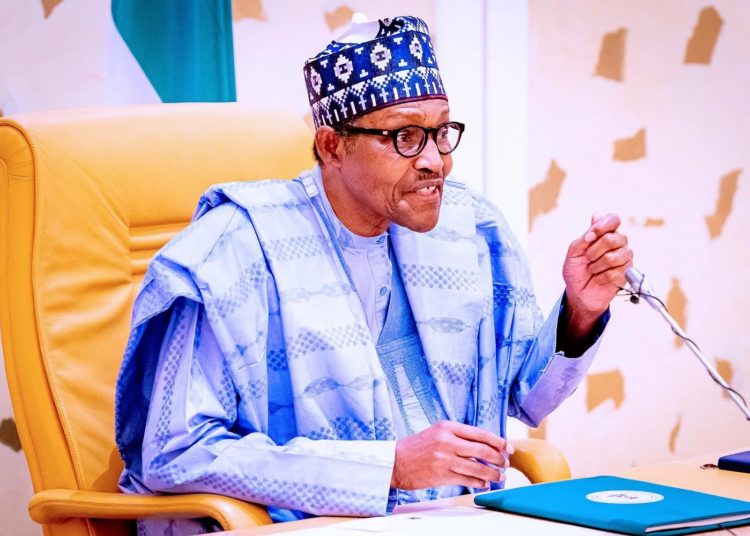With a daunting N67.7trillion debt profile facing the country, economists have flayed plans by the federal government to borrow a fresh N10.78 trillion to finance the deficit in the N21.83 trillion 2023 Budget signed into law by President Muhammadu Buhari, yesterday in Abuja.
President Buhari, yesterday, signed the 2023 Budget of N21.83 trillion along with the 2022 Supplementary Appropriation Bill into law.
Speaking at the signing of the eighth and final annual budget of his administration, Buhari, in a statement by presidential spokesman, Femi Adesina, said the aggregate expenditure of N21.83 trillion is an increase of N1.32 trillion over the initial Executive Proposal for a total expenditure of N20.51 trillion.
The president explained that the 2022 Supplementary Appropriation Act would enable the administration to respond to the havoc caused by the recent nationwide floods on infrastructure and agriculture sectors.
The budget has N8,271,882,354,405 trillion non-debt recurrent expenditure, with total CRF charges of N2,150,882,322,038 trillion.
RELATED: Buhari Signs N21.83trn 2023 Budget Into Law
Total expenditure in the budget is N4,934,352,745,705 trillion, while total capital supplementation gulps N855,700,746,399 billion. Defence got N1,091,875,921,153 trillion
In the new budget, the federal government hopes to generate N3,475,406,123,342 trillion from government owned enterprises (GOEs), while it would be spending N6,309,870,967,327 trillion.
A breakdown of the figure shows that the government would be spending at least N4,495,111,346,991 trillion on domestic debt (including ways and means).
It would also be spending N1,814,759,620,336 trillion to service foreign debt in 2023.
As is customary, he said the minister of finance, budget and national planning will subsequently provide more details of the approved budget and the supporting 2022 Finance Act.
”We have examined the changes made by the National Assembly to the 2023 Executive Budget proposal. ‘The amended fiscal framework for 2023, as approved by the National Assembly, shows additional revenues of N765.79 billion, and an unfunded deficit of N553.46 billion.
“It is clear that the National Assembly and the executive need to capture some of the proposed additional revenue sources in the fiscal framework. This must be rectified.
”I have also noted that the National Assembly introduced new projects into the 2023 budget proposal for which it has appropriated N770.72 billion. The National Assembly also increased the provisions made by Ministries, Departments and Agencies (MDAs) by N58.55 billion.”
President Buhari further stated that his decision to sign the 2023 Appropriation Bill into law, as passed by the National Assembly, was to enable its implementation commence without delay, considering the imminent transition process to another democratically elected government.
He, however, directed the minister of finance, budget and national planning to engage with the Legislature to revisit some of the changes made to the Executive budget proposal, expressing the hope that the National Assembly will cooperate with the executive arm of government in this regard.
He urged the National Assembly to reconsider its position on his proposal to securitise the federal government’s outstanding Ways and Means balance at the Central Bank of Nigeria (CBN).
”As I stated, the balance has accumulated over several years and represents funding provided by the CBN as lender of last resort to the government to enable it to meet obligations to lenders, as well as cover budgetary shortfalls in projected revenues and/or borrowings.
”I have no intention to fetter the right of the National Assembly to interrogate the composition of this balance, which can still be done even after granting the requested approval.
”Failure to grant the securitisation approval will, however, cost the government about N1.8 trillion in additional interest in 2023, given the differential between the applicable interest rates which is currently MPR plus 3% and the negotiated interest rate of 9% and a 40 year repayment period on the securitised debt of the Ways and Means.”
To ensure more effective implementation of the 2022 capital budget, President Buhari thanked the National Assembly for approving his request for an extension of its validity date to 31st March, 2023.
He directed the Ministry of Finance, Budget and National Planning to work towards early release of the 2023 capital votes to enable Ministries, Departments and Agencies commence the implementation of their capital projects in good time to support efforts to deliver key projects and public services as well as improve the living conditions of Nigerians.
Reiterating that the 2023 Budget was developed to promote fiscal sustainability, macroeconomic stability and ensure smooth transition to the incoming Administration, the President said it was also designed to promote social inclusion and strengthen the resilience of the economy.
He pledged that adequate provisions have been made in the Budget for the successful conduct of the forthcoming general elections and the transition programme.
On achieving revenue targets for the budget, the President directed MDAs and Government Owned Enterprises (GOEs) to intensify their revenue mobilization efforts, including ensuring that all taxable organizations and individuals pay taxes due.
To achieve the laudable objectives of the 2023 Budget, the President said relevant Agencies must sustain current efforts towards the realization of crude oil production and export targets.
”To augment available fiscal resources, MDAs are to accelerate the implementation of Public Private Partnership initiatives, especially those designed to fast-track the pace of our infrastructural development.
”This, being a deficit budget, the associated Borrowing Plan will be forwarded to the National Assembly shortly.
”I count on the cooperation of the National Assembly for a speedy consideration and approval of the Plan,’’ he said.
On the Finance Bill 2022, the President expressed regret that its review as passed by the National Assembly is yet to be finalised
”This is because some of the changes made by the National Assembly need to be reviewed by the relevant agencies of government. I urge that this should be done speedily to enable me to assent into law,” he said.
Experts worry over fresh borrowing, transition
Commenting on the appropriation, economists said plans to borrow fresh N10.78 trillion to finance the budget deficits further amplifies the troubling fiscal outlook for the economy, calling for budget reforms.
On his part, chief executive officer (CEO) of the Centre For The Promotion Of Private Enterprise, CPPE, Dr. Muda Yusuf, called for a repositioning of the power sector as well as address lingering downstream oil sector challenges to enable major investment inflow into the country by 2023.
Yusuf, said, government should take firm stand on power sector reforms and full implementation of the PIA, to unlock investments in the coming year.
Yusuf, who was the former director general (DG) of the Lagos Chamber of Commerce and Industry (LCCI), however, noted that in order to unlock growth and investment in 2023, the government must undertake some urgent reforms.
He posited that the enactment of the PIA was a major step towards the reform of the oil gas sector which promises to transform the sector through the creation of a legal and regulatory framework that would inspire much higher levels of investors’ confidence.
“The deregulation of the petroleum downstream sector is a major economic reform imperative. This is inevitable if we must unlock investment in the sector and put an end to the perennial fuel scarcity and the monopolistic structure of the sector,” he said.
Calling for consolidation on the power sector reforms, Yusuf, said “an enabling environment must be created to sustain current private sector investment in the sector and attract new private capital to the electricity sector. Urgent reforms are vital with respect to electricity tariff, metering and deepening of energy mix. We need robust incentives [fiscal and monetary] to boost private investment in renewable energy.”
He also urged adequate reform of the budget and appropriation processes to prioritise infrastructure financing and human capital development.
Some economic analysts told LEADERSHIP that the federal government may not be able to implement the budget to significantly improve the economy, basing their argument on the fact that it is a transition government.
Stephen Kanabe said it will be hard to expect much from the present government because it will merely implement the recurrent aspect of the budget.
Also, Mr Nwosu Nnamdi, who is an investment expert, said the capital component of the budget will suffer “because in an election year like this, politicians are more likely to shift attention to campaigns, while abandoning infrastructural development.”
He said the Buhari government can still make an impact on the economy by releasing funds for execution of capital projects in the new fiscal year.
Also, speaking to LEADERSHIP, president of the Nigeria Consumer Protection Network (NCPN), Kunle Kola Olubiyo, said government should relinquish its 40 per cent equity in the Distribution Companies (DisCos), so that frequent interventions which had largely drained government treasury would reduce.
He said that with Nigeria’s total debt standing effectively at N67.7 trillion by end of 2022, it would not be advisable for government to consider committing scarce resources to the sector.
He pointed out that the success of any economic diversification and inclusive growth strategy is anchored on industrialisation and, in turn, massive industrialisation depends on a robust, sound and highly efficient power sector which will ultimately bring about the needed economic transformation envisaged.
He identified liquidity crunch as the biggest challenge of the Nigerian electricity sector today.
As a result, he said, the 11 DisCos have been struggling to meet their obligations to the Nigerian Bulk Electricity Trading Plc (NBET) and Market Operators (MO) as evidenced in their low remittances to NBET and MO.
He called for review of the power sector privatisation after the expiration of the ten year moratorium but the banks which have taken over some DisCos should be allowed time to recover their debts.
Olubiyo, who described the privatisation of the power sector as a failure, urged the government to call for fresh bids in the course of the year so that the private sector with competence to take over the near failed DisCos..
Nigeria’s N67.7trn Debt To Frustrate Economic Growth In 2023—OPS
The Lagos Chamber of Commerce and Industry (LCCI) has expressed worries over the implications of Nigeria’s debt burden and expressed fear that this may cripple efforts to really transform the economy.
The chamber, while reviewing the 2022 economy with a projection in 2023, reported that with the approved plan of the federal government to restructure its Ways and Means loans of N23 trillion, Nigeria’s total debt stood effectively at N67.7 trillion by the end of 2022.
The LCCI noted that, at the end of the first half of 2022, Total Debt Service stood at N2.597 trillion, higher than the prorated sum of N1.978 trillion by N619.81 billion (31.33 per cent).
Also, the interest payments on Ways and Means collected from the Central Bank of Nigeria (CBN), amounted to N714.74 billion.
Citing data from the Budget Office of the Federation, the chamber said that the sum of N1.333 trillion was used for domestic debt servicing, a difference of N52.34 billion (4.09 per cent) from the prorated half year projection, while N549.70 billion was spent on external debt servicing during the period under review.
“Clearly, we must watch the cost implications of our borrowing and spending.” it warned.
To be able to revive the economy, the LCCI said, the federal government would need to sustain its targeted interventions in selected critical sectors like agriculture, manufacturing, export infrastructure, tackling insecurity, and free more money from subsidy payments.
“It is very imperative that we need sound monitoring and evaluation over the budget allocations to capital projects and defence spendings to respectively tackle infrastructural deficit and the fight against insurgency.
“We urge the government to tackle oil theft to earn more foreign exchange, borrow from cheaper sources to reduce the burden of debt servicing, and pave the way for the removal of the fuel subsidy by the incoming government.
“With increased spending by the government for census and general elections, the government must block revenue leakages, reduce costs, and empower the private sector to create jobs and generate more revenue to the government” the chamber advised.







